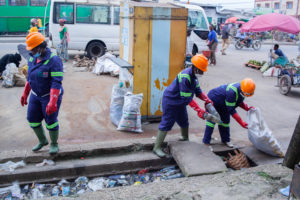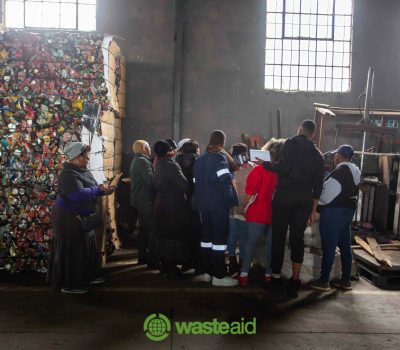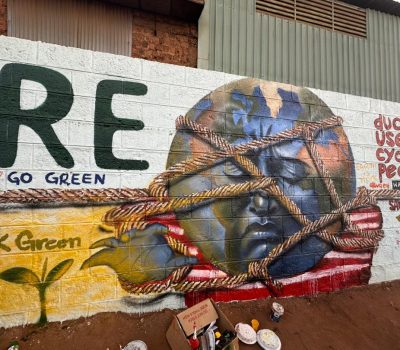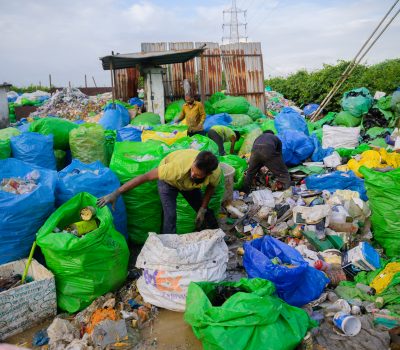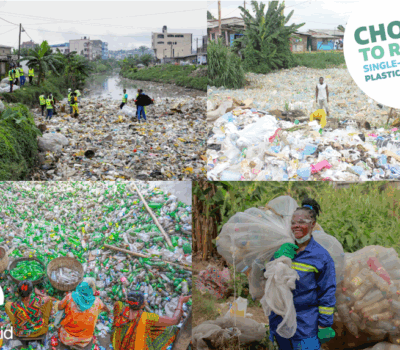WasteAid improves livelihoods and reduces plastic pollution in Douala, Cameroon thanks to the generosity of the British public and match funding by the UK government.
News
Author: Rose Bradbury
Published: 16 December 2022
PRESS RELEASE
16 December 2022
WasteAid’s recent work in Cameroon has led to people in need of support securing employment and improving their livelihoods whilst keeping plastic out of the ocean. WasteAid’s Widening the Net UK Aid Match appeal launched in May 2019 and was supported through donations made by the British public and match funding from the UK government.
Despite Covid-19 posing great difficulties to the project’s delivery, WasteAid worked with local partner RED-PLAST to train 165 unemployed local youths, women and men in waste recovery solutions and problems posed by plastic waste, including consequences to environmental and public health, so as to help them enter the waste management workforce and scale up capacity to recover recyclable plastic waste. WasteAid has also developed a productive relationship with the local council, whose staff supported the project, particularly its campaign to raise awareness among business owners and market stall holders to enable collection of their plastic waste for recycling.
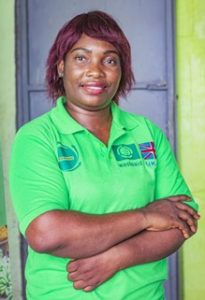
Ceris Turner-Bailes, CEO of WasteAid, says: “We’re very grateful to those who supported our fundraising appeal in 2019 that enabled our work in Douala. We’re proud to have delivered an impactful programme that has improved the lives of many within the communities where we work through training and economic opportunity, whilst at the same time reducing plastic pollution within the Douala estuary.”
As a result of implementing a more efficient and effective plastics collection and recycling system in the borough Douala III, over 17 tonnes of plastic were prevented from entering and polluting the ocean, which is the equivalent of more than 850,000 bottles. Trainees went on to collect nearly another 30 tonnes of plastic from local businesses, preventing further pollution to local rivers and drains. Employment was also secured for those in need of support, thanks to generosity of British public and UK government. Project participants expressed having greater confidence and transferable skills to access long-term job opportunities in and outside of the waste sector, with 74% of participants now employed as a result of the training and work experience. Some are employed by our partner RED-PLAST, some elsewhere and some have set up their own enterprise to collect recyclables.
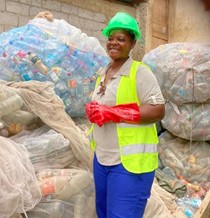
WasteAid would like to thank the UK government and the UK public who supported their Widening the Net campaign. With this help and through this project, WasteAid’s vision of a world in which waste causes no harm, and where people in poverty are empowered to recover its value, has been supported.
ENDS
Notes to editors:
About WasteAid
- WasteAid is a leading international development organisation on a mission to tackle the global waste crisis. 2 billion people do not have their waste collected and 3 billion lack a decent disposal site, leading to the spread of disease and polluting the air, land, rivers and oceans.
- WasteAid works with governments and communities in low-income countries to address the root causes of climate change and marine plastic pollution.
- WasteAid shares waste management knowledge and skills; trains people to become self-employed recycling entrepreneurs; and influences decision-makers and the donor community to increase investment in waste management.
About UK Aid Match
- UK Aid Match brings charities, the British public and the UK government together to collectively change the lives of some of the world’s poorest and most vulnerable people.
- It is designed to allow the British public to have a say in how UK aid is spent and provide opportunities to engage with international development issues, whilst boosting the impact of the very best civil society projects to reach the poorest people in developing countries.
- For every £1 donated to a UK Aid Match charity appeal by an individual living in the UK, the UK government will also contribute £1 of UK aid, up to £2 million, to help these projects go further in changing and saving lives.
For further information visit www.ukaidmatch.org
Contact:
Rose Bradbury
Senior Fundraising & Communications Officer
WasteAid

